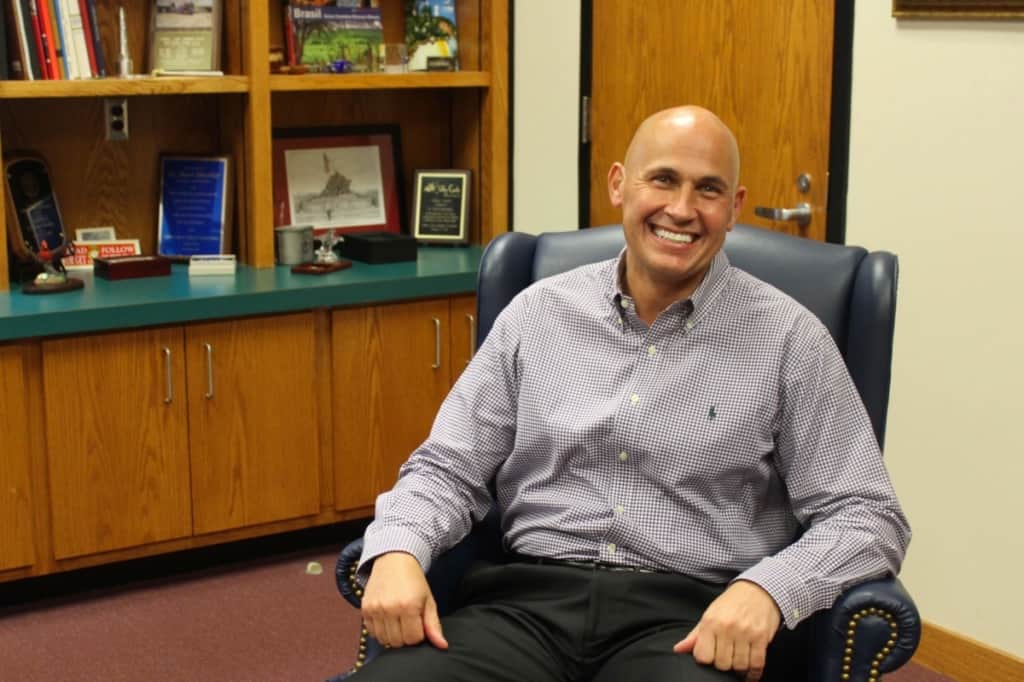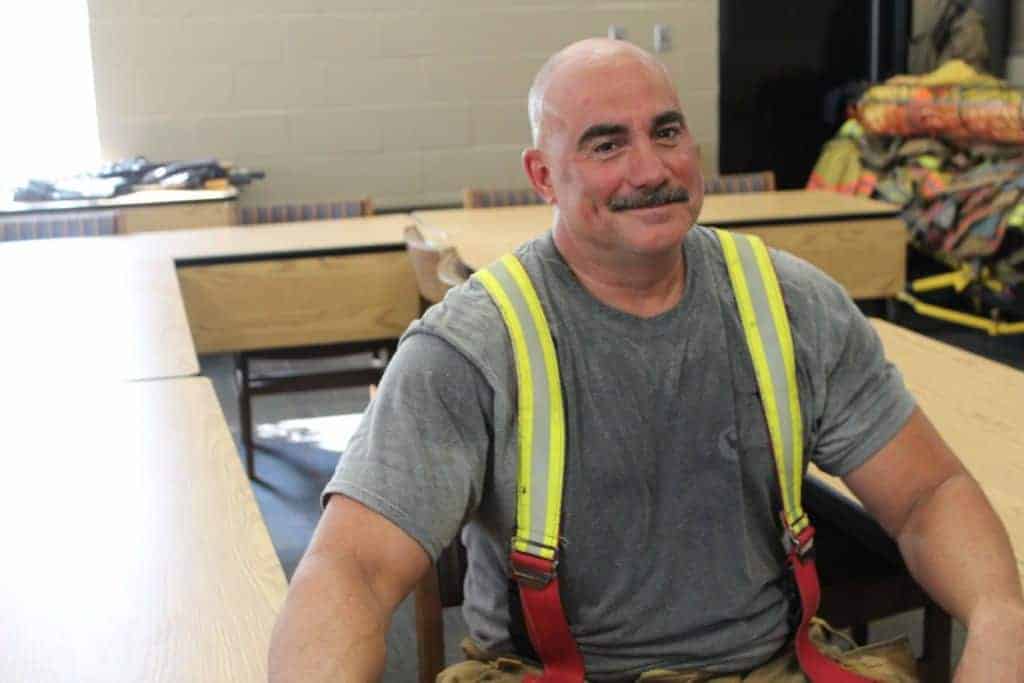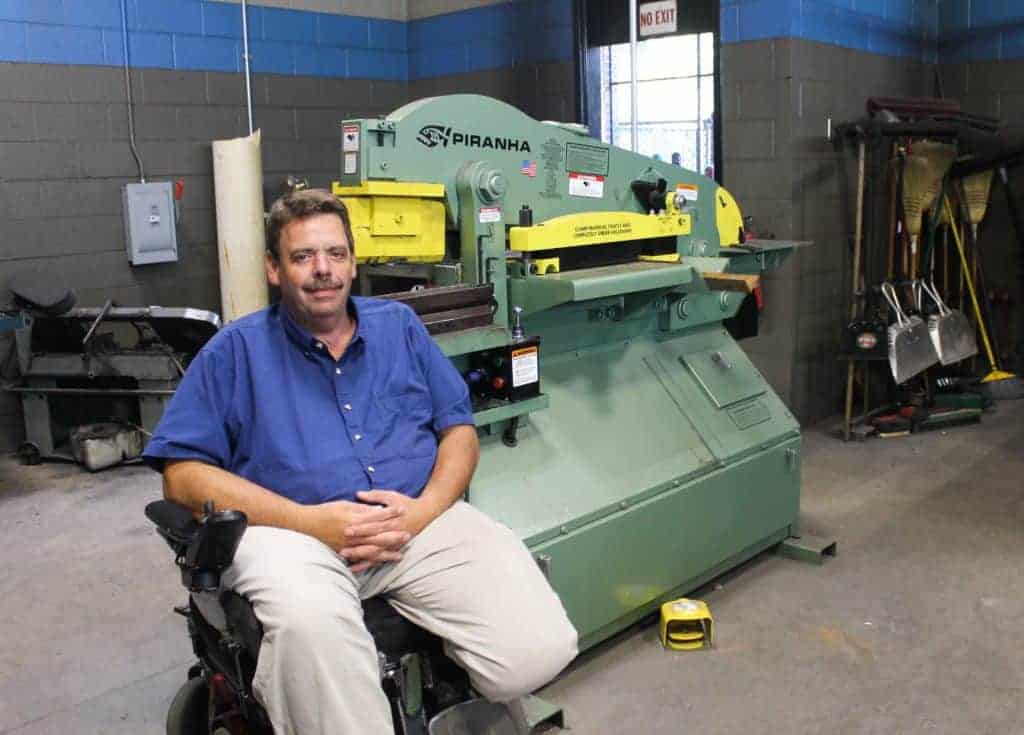
At the end of August, the EducationNC team took on the massive task of visiting all 58 community colleges in the state in about a week. The “blitz” followed an investment from the John M. Belk Endowment allowing us to delve into community college news and coincided with the launch of our community college-centered initiative, Awake58.
During blitz week, I visited five different community colleges, and Surry Community College in Dobson was my third stop. In the middle of a jam-packed tour of all things unique to Surry, I sat down with President David Shockley to hear his perspective at the top. Shockley happens to not only be the president of Surry Community College, but he’s also the president of the North Carolina Association of Community College Presidents — effectively, the ‘president of the presidents.’
We spoke about Surry’s strengths and challenges, key workforce training programs, and the college’s true spirit. See our insightful conversation below, edited for length and clarity.
Bendaas: What is your college’s biggest hidden secret?
Shockley: I think if you looked at the college’s biggest secret, it would probably be the programs that we chose to show you today. A lot of campuses are doing advanced manufacturing. We all know about the job shortages. All of those things are very, very real. But Surry Community College — as all community colleges in North Carolina — we serve the public service sector. So that deals with the quality of life and often times people ignore it, but law enforcement officers in North Carolina probably were trained at a community college. EMS and emergency services and EMTs that come out or go to accidents or those types of things — trained at community colleges. Fire, volunteer firemen, professional firemen, and all those we take for granted every day — trained at community colleges nine times out of ten.
“Did I miss anything?” These future officers are learning how to interview witnesses @surrycc! @Awake58NC @EducationNC @NCCommColleges #weare58strong #Awake58 pic.twitter.com/d16Lmbnxgn
— Yasmin Bendaas (@yasminbendaas) August 29, 2018
At Surry Community College, we have a longstanding tradition of excellence in those programs and put resources in those programs in the early 2000s through bond issues to build the range that was covered today and where they ignited the gas tanks and those type things.
So this morning @surrycc was kind of hot 🔥. @NCCommColleges @Awake58NC @EducationNC #Awake58 pic.twitter.com/4PGAsULVRi
— Yasmin Bendaas (@yasminbendaas) August 29, 2018
I think that would be our best hidden secret because our programs consistently, year in and year out, achieve 100 percent first-time test-taking passage rates in those public service sectors. A lot of things that we do are no different than a lot of community colleges, but we do those particular programs exceptionally well. Any graduation that we have of BLET, which is Basic Law Enforcement Training, those officers and/or our EMS students when they graduate —we’ll have five or six surrounding counties here to honor graduates. That’s no coincidence, and so I would say that’s one of our best kept secrets.

Bendaas: Do you have any funding priorities over the next three to five years?
Shockley: When we look at our funding priorities, our hospitals want us to do a surgical technician program. Well, that is a very, very expensive program because you have to replicate an emergency department that would be in a hospital. Health information technologies is another one. We’ve had that one on the slate. We’re approved. We’ve gone through all the approval processes. We don’t have the money to do that program. So those would be two programs.
Viticulture and enology, we’ve been able to secure some non-recurring funding, but you have covered that program, and it is the only one really in the nation — if you want to get technical about it — one of the most unique in the world. We have been part of an industry that grew from 74 million [dollars] in 2004 to a two plus billion [dollar] industry in 2018, and this community college has been the basic training arm of that movement in North Carolina, for the wine movement. But we actually lose money on that program because it is a high cost program.
We did secure $250,000 two years ago. Senator Randleman [R-Stokes, Surry, and Wilkes] made that happen for us, and then we went through again in the Senate and we received $500,000 that we asked for. But it was non-recurring, and so we’re going to ask for that money recurring to support the work that we do for business and industry. In this case, we are a designated center, and so we are the designated center for viticulture and enology for North Carolina. But we’re the only center that gets zero recurring funding right now. We have made some headway — very, very grateful for that, but that is a funding priority, to get the money to support that program because right now we’re taking other resources from the institution to support the economic development of the wine industry. Nothing wrong with that, but when you’re a designated center and that sort of goes beyond the education realm, now you’re getting into the business and industry realm of that program, and we’re a critical component of that. We need that funding.
3 weeks away from harvest for these beauties @surrycc vineyards! You know you wanna taste! @NCCommColleges @Awake58NC @EducationNC #Awake58 pic.twitter.com/hLCh7iMFTp
— Yasmin Bendaas (@yasminbendaas) August 29, 2018
The next thing that is critical for us is we have built two buildings at our Yadkin Center in Yadkin County. We built two buildings in three years, and it’s the first time that students have been able to get a college transfer credential and, as of August 15th, a technical credential in advanced manufacturing, welding, machining, robotics, and electrical wiring systems and electronics, and those type things. The next thing we have to do is get multi-campus funding for that Yadkin Center and the work we’re doing there.
So we have clear, laid out plans to be able to make the institution financially stable. We have legislative priorities that we will be working with our other 57 colleges to develop. This year I serve as the president of the North Carolina Association of Community College Presidents, so we laugh and say ‘I’m the president of the presidents.’ But this year, getting a well-developed legislative plan that would span for two to four years — not just a one-year plan — is a major priority for me, and that’s my number one goal, to do that for the system, which would only also help Surry Community College but the other 57 community colleges as well.
Bendaas: You had mentioned economic development. Can you tell me about Surry Community College’s place in economic development in this region?
Shockley: Surry Community College is the number one catalyst for economic development in Surry and Yadkin counties, without a doubt.
We’re the only higher education game in town, and we’re the only one that has that mission.
For us to be successful, I think at the end of the day, it begins and ends with Surry Community College in our ability to meet the current training workforce needs and the employees that they already have, as well as producing students [and] graduates through certificates or degrees in those advanced manufacturing jobs … We feel a lot of pressure in making that happen. I feel like we’ve responded extremely well at Surry Community College.
One of the things that I’m most proud of in the seven years that I’ve been here is that the state has the program called Customized Industry Training. In Customized Industry Training, it works with companies that relocate to North Carolina or companies that have expansion and those type things. We haven’t had a lot of new companies locate inside of Surry and Yadkin counties, and so working with our existing companies, developing a new model of doing this business and industry training, Surry Community College was tied for number one in the state in the number of Customized Industry projects. When you look at the top five, it’s colleges like Guilford, Wake Tech, Central Piedmont, Gaston, and colleges that are surrounded by urban areas. But here we are in a rural area, and we’ve stayed in the top five, really in the top four, for the past three years. This past year we tied with Guilford for number one in the number of Customized Industry projects. That’s one indicator that shows that we’re meeting the needs of our existing businesses and industries, and we really spend a lot of time in developing a new model [for] going out and meeting those needs.
We have one company that is a clothing manufacturer and distributor, and I will protect the innocent even though they would tell you this in an interview (I don’t want to divulge any of their information), but it is one of the largest in the world that has a facility here and they use our training now over the corporate training. Their employees said [our training] is better than [theirs] so they went locally out of this region, asked corporate in New York if they could use our training instead just to see how it worked out, and now they’ve moved to us for almost all of their training needs over their own company training. That’s a testament once again of what we’re doing at Surry Community College.
And some days the news isn’t as good. We had an issue years ago with our welding program. It was my first year here, and it was not good. We spent the resources. We did all the work. We brought in new faculty members, and lo and behold, we went from a program of 12 part-time students to a program of over 100 students. One company in particular that did relocate here, the owner of the company came through and basically I had to look at him and say, ‘Will you trust me to fix this and make it right?’
So that was a bad day when you know that you’re not meeting their needs. And a good day is about two years later, I received an e-mail and it was from the owner and CEO of this company that works with companies like Deere-Hitachi, Caterpillar, and those type things. He said, ‘I should’ve sent this a long time ago. We just tested 10 of your welders at our company. They all passed our welding test with flying colors, and a couple years ago you promised me you would deliver and I [e-mailed] to tell you congratulations on a job well done.’ Our own Michael Dixon was the faculty member of the year last year, who was a welding instructor.
So that’s an example where when you get knocked down, you get up, and you keep moving forward, and you get the job done. I’m very proud of Surry Community College for that kind of spirit in moving forward. We had a bad day, but we turned it around and made it a good day.
As far as having a faculty member recognized as the faculty instructor of the year for the North Carolina Community College System — that’s pretty special stuff.

Bendaas: What are some of the biggest challenges that Surry Community College faces?
Shockley: It’s enrollment right now. And enrollment drives finances and then the funding in the funding model that we operate under. Unequivocally, those are the barriers, but there’s no silver bullet with that. Even if we were able to get the equipment, like we just built a brand new facility in Yadkin. Spent $5 million on that facility. It’s state of the art. There’s nothing in there that’s not brand new, state of the art.
What we face in the challenge with enrollment is, one, our population is shrinking in Surry and Yadkin counties, so your pipeline is shrinking.
When you look at this, one of the issues that we face is that where the jobs are and where the best paying jobs are, students don’t want to do those programs. People are coining an interest gap in some of the best jobs that we have to offer. We have put students in the mechatronics program and the electronics program … but I have seen 20 year-olds come out of high school, stay here for two years, and leave this door making a base salary range from $45,000 a year to $69,000 a year on the highest end with one of the companies that we have. That’s a two-year degree and able to make that kind of income right out of this program at that age, and that is life altering for some of these students.
We actually had a welder that went down on the coast and did pipe welding after leaving here. Nineteen years old. He had a hundred thousand dollar W2 his first year out of this program doing pipe welding.
Those are the jobs that we have, but right now we face so many struggles in the interest gap. A large part of it comes from the lay-offs that happened in the early 2000s. Then in 2008 when a lot of American jobs went overseas with the free trade agreements and the NAFTA agreement and those type things. You had many generations that supported families and you would have two or three generations that may have worked at a textile company or a furniture company and made very good salaries — firmly in the middle class — and were able to support a family and very good quality of life. And their jobs left them, so that leaves a sad and bad taste in your mouth. Now you start guiding, ‘Do anything but in manufacturing.’
Now manufacturing is back, but manufacturing is very, very different. I don’t think that Surry County or Yadkin County will ever have a company that employs three or four thousand people the way it used to happen in the ’50’s, ’60’s, and ’70’s, and even in the early ’80’s when things were really, really good and things were really, really robust. Now companies are coming back like Pittsburgh Glass Works. When they arrived — it’s all robotics-driven. It’s all machinery-driven. Those jobs are highly, highly technical, but they produce millions of pieces of glass for automotive manufacturers, like the rear glass in the Ford F-150 pick-up that is a seamless glass that is made right here and shipped out. But they can do that with maybe 150 employees.
They need employees, and there’s not any one of our companies right now that are not absolutely hemorrhaging for employees and technical employees.
With that, we face an interest gap. We talked … a little bit ago of feeling that pressure and having to be successful so that our community can be successful — that’s another pressure that we face, is trying to get students interested in a program when they’ve heard for years from parents and education to do anything but those jobs. But now that’s where all the jobs are, and it’s some of the highest paying jobs, not only in Surry and Yadkin counties, but in North Carolina and indeed the nation.
That’s just a long drawn out [answer], but you face a declining population and interest gap, and yet you’re putting all of these resources into it. It can be very, very stressful.
Bendaas: I’ve had a great visit today. Is there anything about Surry Community College that you want me to know that I haven’t asked?
Shockley: I love this community college. I love the spirit that we have. The excellence that we do year in and year out. The people, that’s our greatest resource that we have. It’s our people and our students, and at the end of the day, that’s what it’s all about.
I believe that institutions or organizations have a soul, and that soul is comprised of everybody that participates in that. Just as individuals, you can have a good soul or a bad soul, and I will say that Surry Community College has a beautiful soul.
We may not always [agree] and we might disagree sometimes amongst us, but when you come from the outside and mess with us, you’re going to have your hands full, that’s for sure. We’re a tight-knit group. We’re small, a relatively small community college when you look at some of them in the state. We’re 22nd or 23rd in size right now out of the 58 community colleges, but we’re nimble, we’re quick, and we consistently produce excellence in all the categories. If we don’t, we take it personal, and we roll up our sleeves, and we go to work, and we make it happen.
I think that’s what makes it special. It’s our employees, it’s our students, it’s our community. It’s just different, and I can’t put my finger on it, but it’s different and it’s special.
Can’t make violins without playing em @surrycc. I may need to come back to take this class. @EducationNC @Awake58NC @NCCommColleges #Awake58 pic.twitter.com/MlkKrOM9hK
— Yasmin Bendaas (@yasminbendaas) August 29, 2018
Keep up with more of EducationNC’s community college coverage @Awake58NC and read a personal perspective penned by David Shockley here.
Weekly Insight Education

